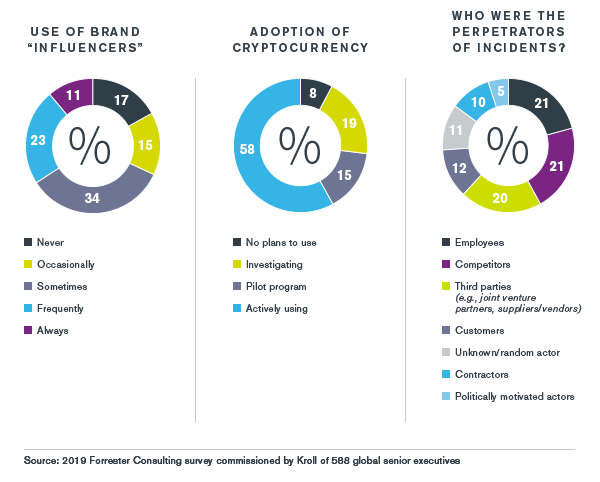Recent developments have shone a bright light on the importance of international commerce to the Italian economy. It is no surprise, then, that survey respondents from Italy are more likely than those from any other country to report having been affected by disruptions due to tariffs, sanctions and changes in trade agreements (38 percent vs. 27 percent globally). At the same time, respondents there are less likely to report that they have been affected by specific geopolitical risks. These responses, taken together, suggest that Italian organizations are troubled by no single geopolitical issue but rather by a mix of concerns that has a particularly potent effect in that country.
Because Italy’s manufacturing base focuses substantially on luxury goods, the country is a perennial target for counterfeiting. Italian respondents are thus more likely to report being affected by counterfeiting (23 percent vs. 17 percent globally) and to make the fight against counterfeiting a priority (70 percent vs. 58 percent globally). Notably, respondents in Italy report an above-average level of data theft (34 percent vs. 29 percent globally), even though the number of data breaches reported by Italian companies is significantly smaller than one would expect for an economy of its size. This suggests a need for more transparency regarding this category of incident.

Italian regulators seem inclined to integrate cryptocurrency into the larger economy. Indeed, respondents in Italy are significantly more likely than those in other countries to report that their organizations actively use cryptocurrency (58 percent vs. 28 percent globally). Only 8 percent of respondents say their organizations have no plans to do so (vs. 19 percent globally).
Italian respondents give high marks to many of their internal detection capabilities. Some of this satisfaction may reflect recent regulatory developments, such as the passing of more comprehensive legislation on whistleblowing and anti-bribery and anti-corruption measures. Eighty-nine percent of respondents in Italy say that their whistleblowing program is effective in detecting incidents (vs. 66 percent globally). Further, 81 percent of Italian respondents say their organizations are effective or highly effective in detecting corruption (vs. 69 percent globally). But the consistency with which Italian respondents consider their detection mechanisms to be effective also suggests that Italian organizations may be overestimating their capabilities and that a more objective review may be warranted.
It is worth noting that respondents in Italy are more likely than average to place priority on combating fraud by internal parties (74 percent vs. 66 percent globally) as well as by external parties (77 percent vs. 68 percent globally). An effective way to do so would be to strengthen the support for transparency and accountability within corporate culture. While new business initiatives are regularly examined for risk implications more often in Italy than elsewhere (85 percent vs. 74 percent globally), in other aspects, Italy hews to the global averages. Increasing transparency and accountability would help address respondents’ fraud concerns.